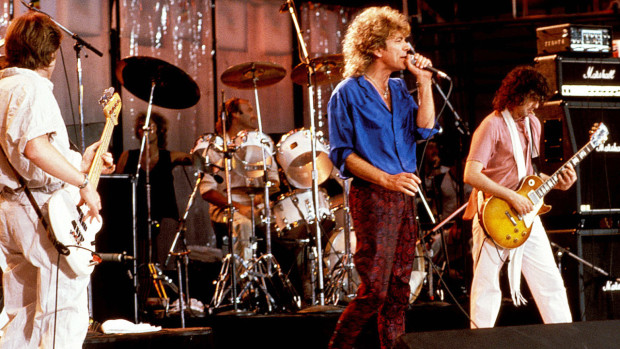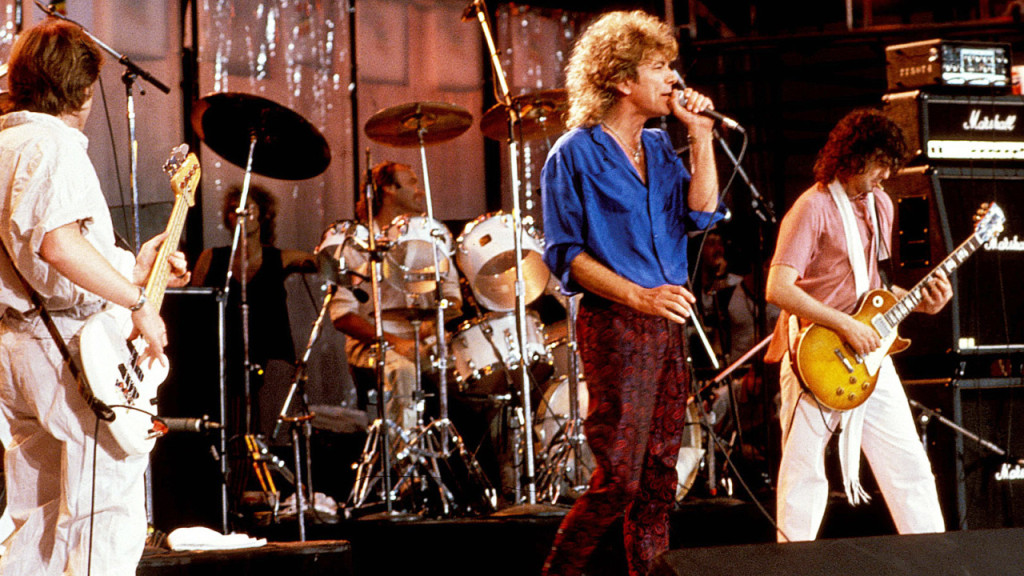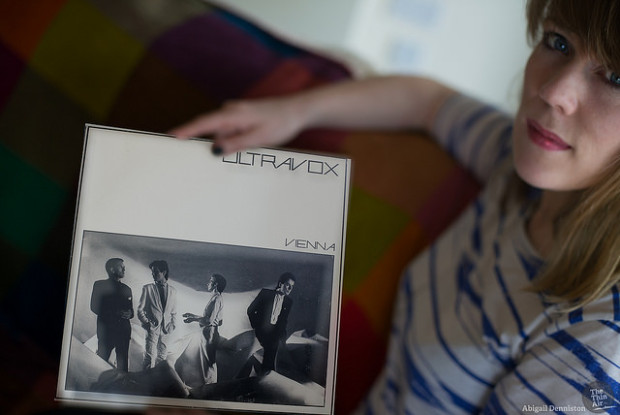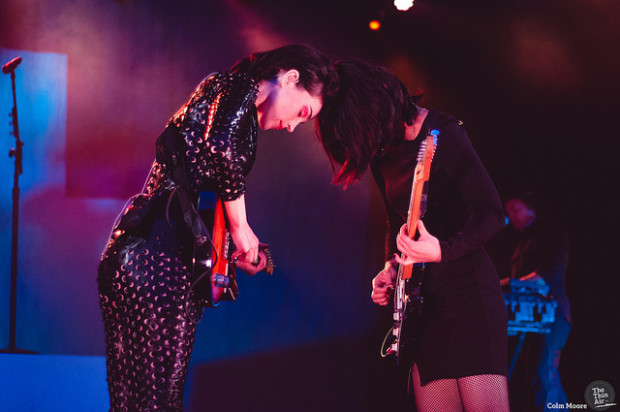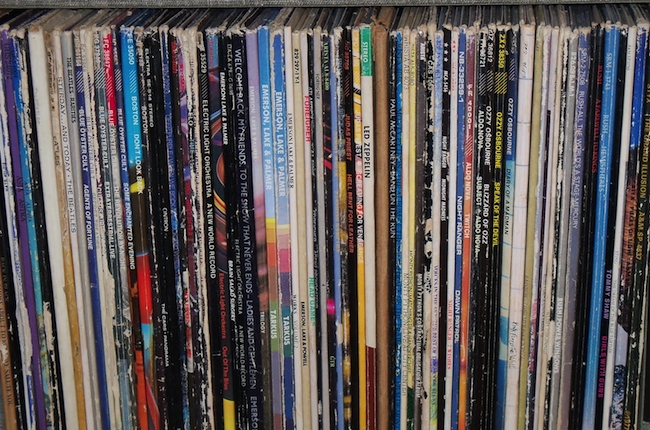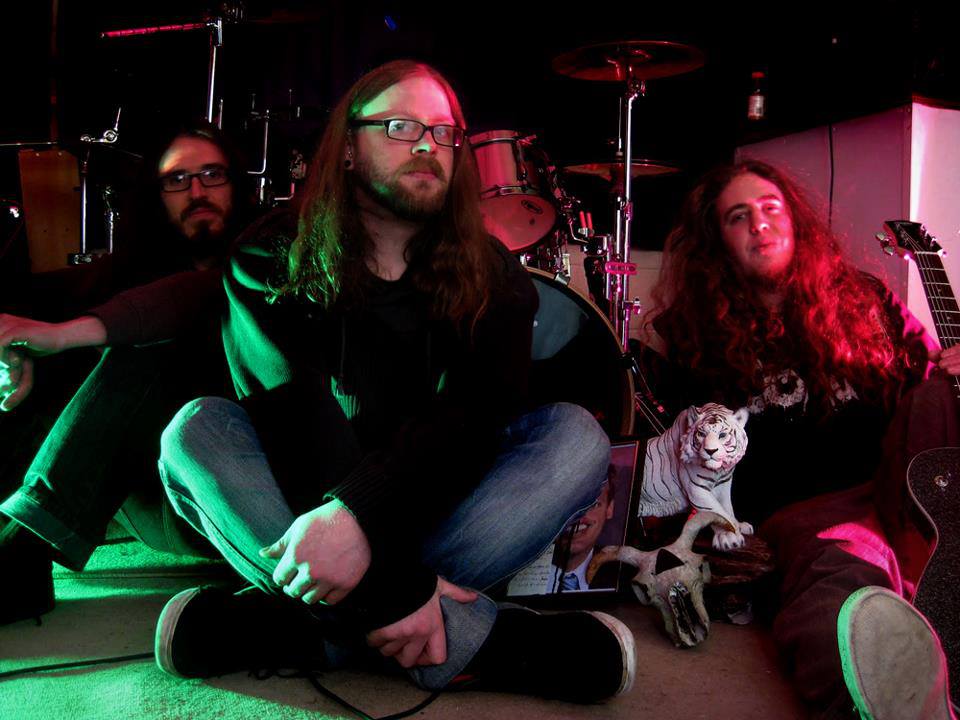In no uncertain terms, Live Aid was a turning point in the history of popular music. Never before on this scale had pop and rock musicians striven to present themselves as a community, a socially conscious bunch of friends who were just trying to, y’know, save the world, man. But rather than a collective of friends, this was more like a club, and the membership was pretty damn exclusive. As the cream of the pop scene clamoured to be involved, one of the most exclusive bands in rock history was waiting in the wings, ready to play it low key. As they would soon discover, Jimmy Page and Robert Plant simply don’t know how to do “low key”.
The death of John Bonham in 1980 had brought Led Zeppelin to a seemingly permanent end. The drummer was more than just the man behind the kit, and the loss of his totemic presence hit the band hard. In truth, the writing was arguably on the wall, after a series of destabilising and debilitating personal and professional problems had broadsided the band since the mid-seventies. The death of Robert Plant’s son Karac had obviously been a huge trauma for the vocalist and the band, whilst albums like Presence (1976) and In Through the Out Door (1979) had been received poorly by both critics and fans alike. As the era of the 70s rock gods was drawing to a close with a new age of sleek, corporate rock dawning, Led Zeppelin seemed uninterested in whether they were to be part of it, and Bonham’s death effectively closed the book upon the band.
But in the early days of the 80s, things began to change. Activism had long been part of popular music’s DNA, as far back as the likes of Pete Seeger and Woody Guthrie’s socially conscious folk songs, or even Louis Armstrong’s subtle, but piercing cry for civil rights in the song ‘Black and Blue’. The late 60s had seen the rise of the counterculture, and a newfound era of protest found a willing ally in rock music, with bands like The Grateful Dead, Jefferson Airplane, and Country Joe and the Fish allying themselves to anti-war causes, playing free festivals, and generally becoming part of the fabric of the Age of Aquarius.
As the 60s became the 70s, a different climate began to settle in rock music. Bands like the Rolling Stones and Led Zeppelin were never quite in step with the ‘peace and love’ ethos of the time. With Black Sabbath providing the blueprint for heavy metal, the Stones and Zeppelin exuded a dark majesty, a heavy, druggy atmosphere that certainly reflected the pain and trauma of the fallout from the Vietnam war, without offering any solutions. This was a time when BIG was better, and it didn’t always pay to have a lot of heart. The Stones may have had ‘Sympathy for the Devil’, and Zep may have hollered about their ‘Whole Lotta Love’, but when it came to the needy and disadvantaged of the world, heart and empathy was in short supply.
Live Aid changed all that, and the change began with punk. With the UK undergoing serious political and social upheaval at the tail end of the decade, many punk musicians felt that it was important – or even crucial – to display a sense of social responsibility. Punk may have had a Stalinist approach to rock’s recent past, but it subconsciously inherited a strain of activism that could be traced right back to the hippies. Bob Geldof emerged from the punk scene, and whilst one can debate just how ‘punk’ Geldof and the Boomtown Rats were (for a punk band, they looked, sounded, and felt very similar to The Rolling Stones), this sense of responsibility was to have a huge transformative power.
The end result of these pangs of conscience was Live Aid. Having been moved by footage of victims of the African Famine, Geldof assembled one of the biggest collections of musicians, and the entire effort was, as he very subtly proclaimed, to “Give me the money.” Fashion and trends are important in rock, and whilst punk hadn’t quite killed off all pre-1977 music, image conscious bands were still keen to toe the line, ideologically speaking. And if one sets the charitable work of Live Aid to one side, it represents a curious phenomenon when a gaggle of millionaire rock stars gathered together to nail their colours to the soul of punk, despite owing absolutely nothing to it.
So, given that it was 1985, with punk and new wave having redefined the mainstream perception of popular music, it’s perhaps surprising when one looks at the line-up. The Wembley Leg of the event saw bands like Status Quo, Roxy Music, Elton John, Queen and The Who resurrect themselves from the doldrums, whilst the US featured Black Sabbath, Crosby, Stills, and Nash, The Beach Boys, Santana, Neil Young, and of course, Led Zeppelin, all hugging and showing how much they cared. It might be 1985, but the line-up could have come from 1975, and the immediate after-effect of Live Aid was not to end the famine in Africa, but to return a whole generation of 70s rock icons back to the charts.
Led Zeppelin opted not to do the obvious thing, and were billed as Jimmy Page, Robert Plant, John-Paul Jones, and Phil Collins. After all, it had only been a few years since the death of Bonham, and as they had said at the time, “We wish it to be known that the loss of our dear friend, and the deep sense of undivided harmony felt by ourselves and our manager, have led us to decide that we could not continue as we were”.
When we think back to Live Aid, there’s every chance we think of Queen and U2 as the absolute show stealers, whilst Bob Geldof was the obvious and prominent public face of the event. But if Live Aid had a true hero, it was Phil Collins, the man who’d formerly been known as the drummer in Genesis, but who had transformed himself in the preceding nine years as a loveable, cheeky chappie popstar with a soulful voice, and a neat line in self-deprecation. For Live Aid, Collins performed some of his own songs whilst accompanying Sting in Wembley Stadium, before hopping on a Concorde to play drums with Eric Clapton, and (not) Led Zeppelin.
Perhaps that transatlantic flight was to blame, but from the moment Page, Plant, and Jones took to the stage, something was wrong. The performance had been one of the most anticipated in the JFK Stadium in Philadelphia, and as the band emerge onto the stage, the sense of expectation from the crowd is palpable. However, they look disorientated and disunited, stumbling into a version of ‘Rock and Roll’ that is tuneless and loose. Page’s guitar is horrifically out of tune, whilst Plant sounds hoarse, and incapable of hitting any of those skyscraping notes that he’d made his name effortlessly grabbing only a few short years ago.
‘Whole Lotta Love’ is even worse, the main riff bent out of all recognition, with Collins battering the kit, almost as if he’d never heard the song before. In later years, Collins would be particularly vocal about the performance, telling Q magazine last year that he considered walking off stage during the show, claiming he wasn’t made to feel welcome by Page, and that the guitarist was “out of it” and “dribbling”. That may be so, but watching the footage, it’s clear that Phil wasn’t quite up to the task either.
Somewhat impossibly, their final song manages to sink even lower. ‘Stairway to Heaven’ has become part of the fabric of rock music itself, but onstage in Philly, Page, Plant, Jones, and Collins pummel the song to death, a thumping, burping mess of a performance that manages to puncture every bit of grandeur the song ever had. The effect is something like a drunken school band struggling to play a song they don’t know, but that someone has hastily described to them.
And the crowd went wild.
Maybe it was the heat, maybe it was the sense of occasion, but the assembled 100,000 people lapped up every tuneless second, and for all that’s it’s worth, Plant seemed to be having fun too. In the aftermath, the critics would get the knives into the band, but Plant appears to have enjoyed the experience enough to reconvene in secret a few months later. Interestingly, given all the stumbling blocks to a Led Zeppelin reunion, it was Page who expressed reluctance, and the two day rehearsal ground to a halt, with bassist Tony Thompson describing his “embarrassment” at being part of such a legendary gathering of musicians who didn’t really know what to play, categorizing the music as sounding like a cross between David Byrne and Husker Du.
Led Zep would get together again in 1988, 1990, and finally in 2007, all subsequent reunions tentative, at best, with Plant continually expressing reluctance to plunder his past. Looking back at the Live Aid concert, Page described it as “pretty shambolic”, whilst Plant’s feelings soured over the years, eventually terming it an “atrocity.”
In the weeks after the concert, albums by Dire Straits, Queen, and many others would feature highly in the pop charts. In commercial terms, Page and Plant would suffer for the rest of the decade, and much of the 90s. Live Aid showed them to be of a different age, a different sensibility. They’d straddled the world like a colossus during the 70s, but as Led Zeppelin struggled to play their greatest songs in front of 100,000 people, it’s obvious that the torch had been passed on, and perhaps to their credit, the biggest, sexiest, darkest rock band on the planet, just couldn’t fit in with the 80s. Led Zeppelin have been remarkably careful with their career and back catalogue, and in retrospect, it’s possible to trace it all back to this moment, when they came so close to throwing it all away to be part of the socially conscious pop set.
With Zeppelin’s back catalogue being lovingly remastered, and sounding fresher than ever, we can look back at Live Aid, and be thankful that the rock band that re-wrote the rulebook, ended up learning the greatest lesson of all – never outstay your welcome. Steven Rainey

